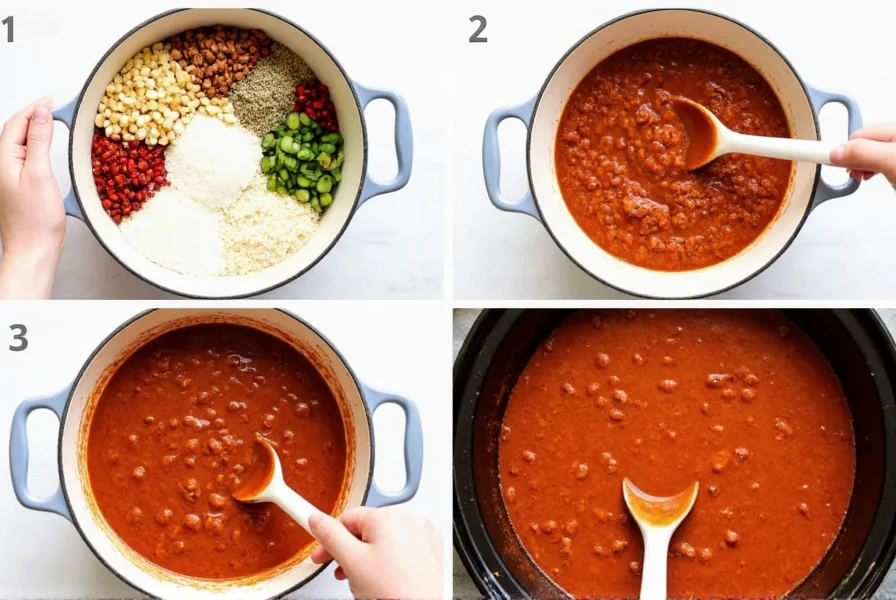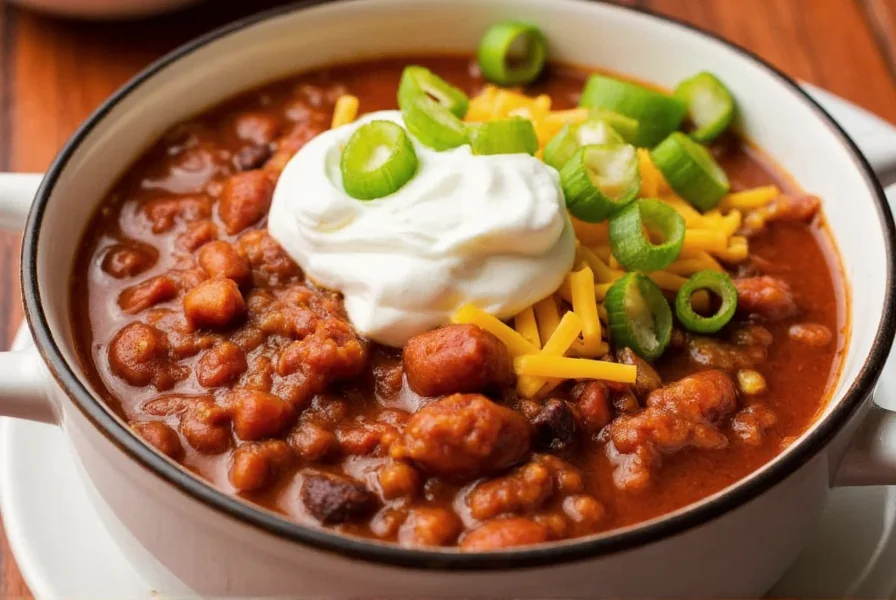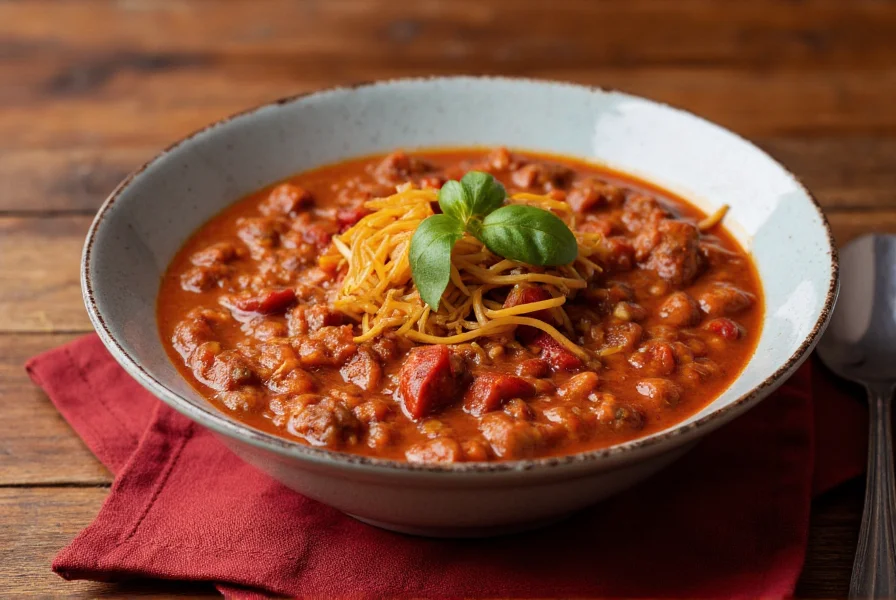The perfect homemade chili recipe combines 1.5 lbs ground beef, 1 onion (diced), 3 cloves garlic (minced), 1 bell pepper (chopped), 28 oz crushed tomatoes, 15 oz kidney beans (drained), 3 tbsp chili powder, 1 tbsp cumin, 1 tsp paprika, 1 tsp oregano, 1 cup beef broth, salt, and pepper. Brown meat, sauté vegetables, combine all ingredients, then simmer for 60-90 minutes. Adjust spice level to taste and serve with your favorite toppings.
Creating exceptional chili requires balancing rich flavors with the right texture and spice profile. This authentic chili recipe delivers deep, complex flavors while remaining approachable for home cooks of all skill levels. Whether you're preparing a weeknight dinner or feeding a crowd at game day, this versatile recipe adapts beautifully to your needs.
Essential Ingredients for Authentic Chili
Quality ingredients form the foundation of any great chili recipe. While regional variations exist, these core components create that signature chili taste everyone loves:
| Ingredient | Quantity | Preparation Notes |
|---|---|---|
| Ground beef (80/20) | 1.5 lbs | Provides rich flavor and texture |
| Yellow onion | 1 medium | Diced finely for even distribution |
| Garlic cloves | 3 | Minced for maximum flavor release |
| Green bell pepper | 1 | Chopped for subtle sweetness |
| Crushed tomatoes | 28 oz can | San Marzano preferred for best flavor |
| Kidney beans | 15 oz can | Drained and rinsed |
| Chili powder | 3 tbsp | Use quality brand for authentic taste |

Step-by-Step Cooking Instructions
Follow these detailed steps for chili that develops deep, complex flavors through proper technique:
1. Brown the Meat Properly
Heat a large pot or Dutch oven over medium-high heat. Add the ground beef without seasoning initially. Breaking it into small pieces, cook until well-browned (not just grayed). This Maillard reaction creates essential flavor compounds. Remove excess fat, leaving about 1 tablespoon for cooking vegetables.
2. Sauté Aromatics
Add onions, bell pepper, and garlic to the pot. Cook for 5-7 minutes until softened but not browned. This builds the flavor base without burning delicate ingredients.
3. Incorporate Spices
Stir in chili powder, cumin, paprika, and oregano. Cook for 1 minute to toast the spices, releasing their essential oils and enhancing flavor complexity.
4. Simmer to Perfection
Add crushed tomatoes, kidney beans, and beef broth. Bring to a gentle simmer, then reduce heat to low. Cover partially and cook for 60-90 minutes, stirring occasionally. The longer simmer time allows flavors to meld and develop depth.

Customizing Your Chili Recipe
One of chili's greatest strengths is its adaptability. Consider these popular variations for different dietary needs and flavor preferences:
- Vegetarian chili recipe: Substitute beef with 2 cups cooked lentils and 1 cup diced mushrooms. Use vegetable broth instead of beef broth.
- Spicy chili recipe: Add 1-2 diced jalapeños with the vegetables and 1/2 tsp cayenne pepper with the spices.
- Texas-style chili: Omit beans and use only meat (traditionally beef chuck, cubed) with additional chili powder and dried chilies.
- Quick chili recipe: Use an Instant Pot for 25 minutes total cooking time while maintaining great flavor.
Troubleshooting Common Chili Problems
Even experienced cooks encounter challenges with chili. Here's how to fix common issues:
- Chili too thin: Simmer uncovered for additional 15-20 minutes to reduce liquid, or mash some beans to thicken.
- Chili too spicy: Add 1-2 tbsp sugar or honey and the juice of 1/2 lime to balance heat.
- Flavor too flat: Brighten with 1-2 tbsp apple cider vinegar or additional salt to enhance other flavors.
- Meat texture tough: Ensure proper simmer time (at least 60 minutes) for tougher cuts to become tender.
Serving and Storage Tips
Chili often tastes even better the next day as flavors continue to meld. Store in an airtight container in the refrigerator for up to 5 days or freeze for up to 3 months. When reheating, add a splash of broth if needed to restore ideal consistency.
Traditional toppings include shredded cheddar cheese, sour cream, diced onions, fresh cilantro, and oyster crackers. For a complete meal, serve with cornbread or over rice.
Frequently Asked Questions
How long should chili simmer for best flavor?
For optimal flavor development, chili should simmer for 60-90 minutes. The extended cooking time allows flavors to meld and deepen. While you can make a decent chili in 30 minutes, the complex flavor profile truly develops with longer simmering. Many chili enthusiasts find that chili tastes even better when made a day ahead and reheated.
Can I make chili in a slow cooker?
Yes, chili adapts perfectly to slow cooking. After browning the meat and sautéing vegetables, transfer everything to your slow cooker and cook on low for 6-8 hours or high for 3-4 hours. The slow cooking process develops rich flavors while requiring minimal attention. Just be sure to brown the meat first for best flavor development.
What's the difference between chili and chili con carne?
Chili con carne literally means 'chili with meat' in Spanish. Traditional chili con carne contains meat (typically beef), chili peppers, and spices, while modern 'chili' often includes additional ingredients like beans, tomatoes, and various vegetables. Texas-style chili con carne traditionally contains no beans, while many regional variations throughout the United States include them.
How can I make my chili less spicy without losing flavor?
To reduce spiciness while maintaining flavor, add 1-2 tablespoons of sugar or honey along with the juice of half a lime. Dairy products like sour cream or yogurt can help counteract heat when served as toppings. You can also add more tomatoes or broth to dilute the spice level. Remember that chili often mellow slightly as it sits, so consider this before making significant adjustments.











 浙公网安备
33010002000092号
浙公网安备
33010002000092号 浙B2-20120091-4
浙B2-20120091-4